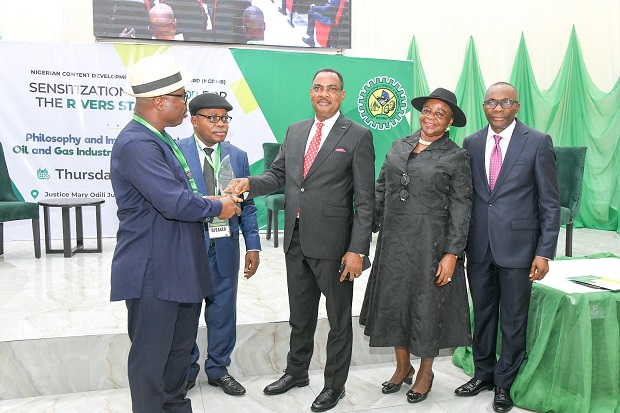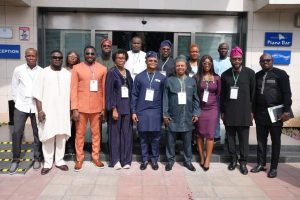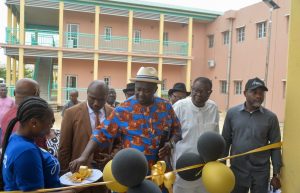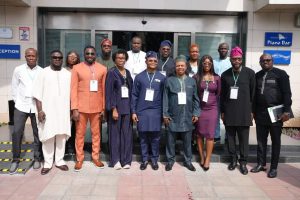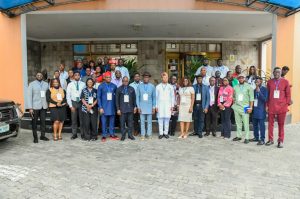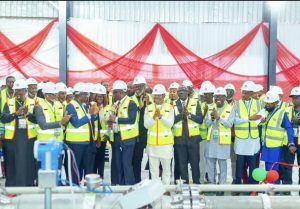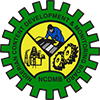As part of its sustained effort to raise awareness on the Nigerian Oil and Gas Industry Content Development (NOGICD) Act among critical stakeholders in the oil and gas industry, the Nigerian Content Development and Monitoring Board (NCDMB) held a one-day sensitisation workshop for members of the Bench and the Bar in the Rivers State capital, Port Harcourt, on Thursday.
In a keynote address the Executive Secretary of the NCDMB, Engr. Simbi Kesiye Wabote, said the Judiciary as the key institution for interpretation of laws is a stakeholder deserving of thorough acquaintance with the salient provisions of the NOGICD Act. According to him, the event in Port Harcourt was “in line with similar workshops organized for Federal High Court Judges, Justices of the Court of Appeal and Supreme Court Justices in 2018 and 2019 in partnership with the National Judicial Institute.”
The NOGICD Act, he explained, was borne out of a resolve to reverse the trend in several decades of oil exploitation during which “only a small, insignificant proportion of the oil and gas industry value was retained in the country.” According to him, “all value adding activities were done overseas, and this resulted in significant capital flight which was estimated to be at about $380 billion over a 50-year period.” Local content was a paltry five per cent, and job losses were in the range of two million during the period “as most jobs were also executed by foreigners.”
With the NOGICD Act and a regulatory agency, the NCDMB, in place, a dramatic turnaround has been achieved through creative and effective implementation of the Board’s core mandates – Develop Local Capacities and Capabilities without Comprising Standards and Monitor and Enforce the Provisions of the NOGICD Act, 2010. In-country value retention hit 54 per cent as of December 2022, surpassing the 42 per cent target set for that year, with the implication that Nigeria now retains at least $10.8 billion of the $20 billion average annual spend of the oil and gas industry.
On key provisions of the NOGICD Act, the Executive Secretary drew attention to Sections 70, 104, and 59 among others. Section 70 sets out the functions of the NCDMB as well as some regulations. The Board is to “Engage in targeted capacity building interventions,” “Manage and grow the Nigerian Content Development Fund,” “Approve Nigerian Content Plans and issue Certificate of Authentication,” among other responsibilities.
Sections 3, 12, and 28 deal with fields of industry operations where Nigerians must have First Consideration. It says such consideration “Shall be given to Nigerian operators in the award of blocks and licences; Nigerian goods and services in the evaluation of bids,” and in the employment and training of workers.
Section 104 prescribes the creation of a Nigerian Content Development Fund, while Sections 37, 38, and 39 deal with Research and Development. In Section 59, the focus is on Effective Monitoring of the Implementation of the Act.
With a “10-Year Strategic Road Map” instituted in 2017 as compass, targeting 70 per cent Nigerian content by the latter date, Engr. Wabote highlighted milestones in capacity building attained thus far in the upstream, midstream and downstream subsectors of the industry. These include two world-class pipe mills and pipe coating yards in FOT Onne, Abuja, Port Harcourt, Lagos; 40 per cent of marine vessels now owned by Nigerians; major fabrication yards (SAIPEM, AVEON, Nigerdock, EWT Nestoil, SHI MCI Yard, MG Vowgas Yard) with a combined nameplate capacity of 250,000 metric tons per annum, and Floating Production Storage and Offloading installation (Egina FPSO), Lagos, the largest of its type in Africa.
Others are establishment and strategic positioning of start-up companies under Project 100; the Nigerian Oil and Gas Parks Scheme (NOGAPS) under which low-cost manufacturing hubs for equipment components and spares are being built; completion and commissioning of a 50 million standard cubic feet gas processing plant and 300 mmscfd gas gathering hub for gas supply into the OB-3 pipeline in Kwale, Delta State, in partnership with Nedo Gas; over 14 million manhours of training covering mandatory sea-time experience, subsea systems, software and hardware modules and enterprise development, and targeted interventions in selected universities across the country.
Earlier in opening remarks, NCDMB’s Manager, Legal Services, Mr Naboth Onyesoh, Esq, expressed appreciation for the large turnout for the event, noting that judges and lawyers deserve to know what NCDMB is and how it works, just as knowledge of its enabling law is important.
Earlier, the Rivers State Governor, Sir Siminalaye Fubara, had declared open the Sensitization Workshop, themed “Philosophy and Imperative of the Nigerian Oil and Gas Industry Content Development Act,” with commendation of the NCDMB “for being alive to its statutory responsibilities.” Represented by the State Attorney-General and Commissioner for Justice, Professor Zacchaeus Adangor, he said, “the intendment of the NOGICD Act is laudable” and that “implementation is crucial,” requiring boldness and courage.
The State Chief Judge, His Lordship, Hon. Justice Simeon Chibuzor Amadi, in his own goodwill message noted that the “benefits of the workshop to Judges are enormous.” According to him, adjudication in oil and gas requires understanding of the workings of NCDMB, the implementing agency, the industry as well as relevant operational guidelines.” He said, “This workshop will remain evergreen in the annals of the State Judiciary.”
The day’s activities were rounded off with a panel presentation entitled “Legal Challenges of Implementing the NOGICD Act: The Role of the Bar and Bench.” The resource persons were Barr. M.B. Umar, Director, Legal Services, NCDMB; Hon. Justice Boma Diepreye; Professor Ibibia Lucky Worika; Dr. William Arugu; Mr. Franklin Gogo Dienye, and Barr. Sammie Somiari (SAN). The moderator was Professor Pereowei Subai.
Plaques of Appreciation were presented to the Chief Judge and the representative of the State Governor by NCDMB’s Director, Corporate Services, Mr. Patrick Daziba Obah. The latter, in closing thoughts, thanked the Chief Judge for demonstrating good leadership and making the workshop a success. Thanks were extended to all who participated. His parting word was, “Capacity building is the beginning and end of Nigerian Content.”
Discover more from Nigerian Content Development & Monitoring Board
Subscribe to get the latest posts sent to your email.
